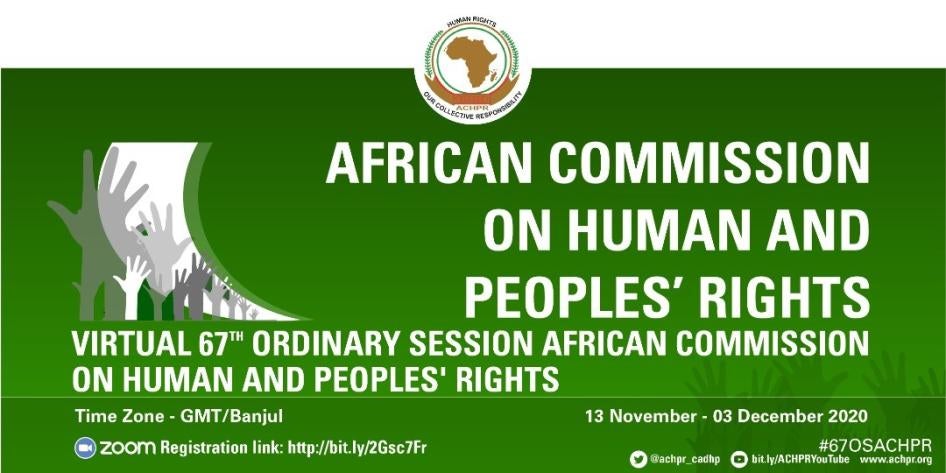Honourable Chairperson and Honourable Commissioners,
We welcome this opportunity to address the African Commission on Human and Peoples’ Rights (African Commission) on the state of human rights in Africa, especially in light of the ongoing COVID-19 pandemic and the holding of national elections in more than a dozen African countries. Some of the elections are being held in countries already gripped by serious humanitarian and human rights crises, notably the Central African Republic, Somalia, Ethiopia and Burkina Faso.
Human Rights Watch is particularly concerned about ongoing violence, as well as the lack of accountability for mass executions allegedly committed by state security forces in Mali and Burkina Faso.
In Tanzania and Uganda, authorities stepped up repression of opposition party members, civil society organizations, and the media ahead of elections in those countries. Since October 2019, Human Rights Watch has also documented how Tanzanian police and intelligence agents, working in collaboration with Burundian authorities, arrested, disappeared, tortured, extorted, or forcibly returned 18 Burundian refugees and asylum seekers.
In Ethiopia, the recent crisis unfolding in the Tigray region is only the latest manifestation of unrest, with heavy fighting reported between regional and federal forces, and access restrictions in the region likely to only broaden the risks to populations living in Tigray and to others throughout the country.
In Guinea, the period following the October 18, 2020, the presidential election was marred by violence and repression. Security forces used excessive force to disperse opposition-led demonstrations in the capital, Conakry, killing at least 12 people and wounding at least 30 others.
In Cameroon’s anglophone regions violent clashes between separatist groups and government forces as well as attacks on civilians by both sides continue to lead to serious human rights abuses. On October 24, 2020, gunmen stormed a private school in Kumba, South-West region, killing 7 children and injuring at least 13 others.
In Nigeria, HRW has called for an end to the use of excessive force by security forces against protesters calling for an end to police brutality across the country. We urged that perpetrators of unlawful and excessive use of force against protesters and the criminal violence by unidentified non-state actors that followed, be held to account.
Regarding Covid-19, African governments should urgently address healthcare deficiencies to meet the demands of the Covid-19 pandemic and ongoing healthcare needs of their populations. In South Africa and Kenya, the lockdowns to slow the spread of the virus exposed existing weaknesses in efforts of authorities to protect women, girls, and others from gender-based violence. The lock down in South Africa left many including migrants, asylum seekers, and sex workers and their children destitute, homeless, and more vulnerable to violence. In Cameroon, there has been little transparency by the government with regards to the disbursement of funds it collected to address the Covid-19 pandemic. Finally, we also note the positive progress in the operationalization of the Special Criminal Court in the Central African Republic and the Transitional Justice Policy at the AU. We take this opportunity to highlight the importance of advancing justice for serious crimes committed in violation of international law and the need for the African Commission to ensure that the AU and African states fully seize opportunities to promote access to credible justice for victims.
Recommendations
We call on the African Commission to urge all States across Africa, notably Tanzania, South Sudan, Ethiopia, Liberia, Guinea, Cameroon, Côte d’Ivoire, Mali, Nigeria to:
- Initiate prompt, independent, and impartial investigations into allegations of human rights violations, including destruction of property, extrajudicial killings, torture, enforced disappearances, sexual violence, and other abuses committed by members of the security forces.
- Ensure respect and protection for the right to regular, free, fair, and credible elections, as well as the right to peaceful protest and assembly, and ensure urgent review and implementation of the various reports on judicial and security sector reform.
- Ensure transparency in the management of Covid-19 response funds and make meaningful investments to improve access to quality health care, for instance call upon African governments to come and fully support India and South Africa’s proposal to relax and waive regulations around intellectual property to allow more freedom to collaborate to manufacture the vaccines and medicines.
- Ensure that national and local Covid-19 response plans address the ways women and girls have been uniquely impacted by the pandemic, develop appropriate responses in consultation with women and girls’ rights organizations, and allocate necessary resources.
- Move forward with the implementation of accountability mechanisms, including the establishment of the Hybrid Court for South Sudan, and those agreed upon in the context of long-standing conflicts, intercommunal violence, and mass atrocities, to ensure perpetrators are fairly held to account.








